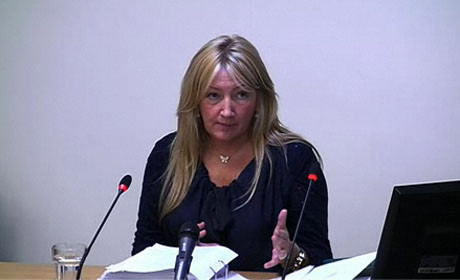
Sly Baily attacked a BBC Newsnight report which carried allegations of phone hacking at the Sunday Mirror
Sly Bailey, the chief executive of Trinity Mirror, has stood by her decision not to investigate whether or not phone hacking has been carried out by journalists within the organisation, stating that there is "no evidence" of wrongdoing.
Giving evidence to the Leveson inquiry today, Bailey said the publisher has not conducted an investigation due to lack of evidence.
"I don't think it is the way to run a healthy organisation, to go around conducting investigations when there's no evidence to say our journalists have hacked phones."
She added that she made sure "our editors were being very clear in reminding people what was acceptable and our absolute adherence to the [PCC] code and criminal law."
She attacked a BBC Newsnight report which last year carried allegations of phone hacking from an unnamed former Sunday Mirror reporter, today telling the inquiry: "They have no evidence and have not come back to us with evidence. They were running unsubstantiated allegations as if it were fact."
At the time of the report Trinity Mirror issued a statement to say all its journalists work within the law and the Press Complaints Commission's code of conduct.
She did, however, launch a review of editorial controls and procedures at Trinity Mirror, following the closure of the News of the World last year.
Bailey was also asked about former editor of the Daily Mirror Piers Morgan and the fake Iraqi photo scandal, which she described as a "catastrophic editorial error".
"It was an awful time for the business after we published those photographs. We were in a maelstrom of interest in the business ... and frankly it wasn't so much the publishing of the photos themselves, which I believe Mr Morgan did in good faith at the time. What happened was in the intervening period that the board lost confidence in him as editor."
She added that they "lost a lot of readers as a result of that episode".
Commenting on the general issue of risk later in her evidence, Bailey said the business is one which does deal with "matters of judgement" and that therefore the "tightening or changing" of controls "would not necessarily change the output" in some cases.
"We understand the business we are in does rely on the good and sound judgment of our editors. We are not producing products all looking the same, we literally reinvent our business every day and that's not without risk and does rely on judgement."
When asked by Lord Leveson about "herd mentality", Bailey said: "I think ours is a very competitive industry but I would hope we didn't have a herd mentality. It's certainly not encouraged."
But she added that changes do need to be made in the industry.
"We've all reflected hard on what's happened and can see changes need to and should be made.
"I run a company which depends on the confidence of investors and the certainty they feel about the business. So from the chief executive's perspective, having uncertainty around our industry is not good for the business, so is something that needs to be looked at."
She later added that it "seems to me we're working towards a model we could all have confidence in."
Free daily newsletter
If you like our news and feature articles, you can sign up to receive our free daily (Mon-Fri) email newsletter (mobile friendly).
Related articles
- The Cairncross Report: first impressions
- Discover Leveson helps journalists examine their profession
- Otherworld aims to make local news and events relevant through location-based storytelling
- Advice from BBC News and Trinity Mirror for introducing debunking into the newsroom
- Can publishers ‘good-ad’ their way out of the ad-blocking phenomenon?









